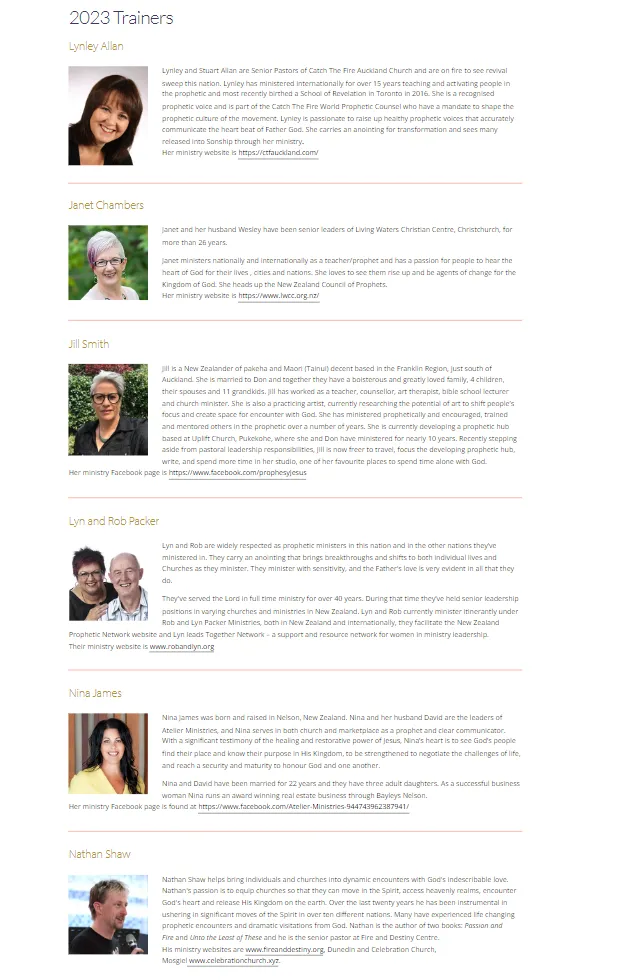School of Prophets Aotearoa
Al Blenney - 24th April 2023

The School of Prophets Aotearoa has this year’s annual training school on 4th-6th May in Christchurch, and the fees are very reasonable ($180) - although you have to pay for dinners and accommodation. But before you rush to sign up, perhaps to find out the next month’s Lotto numbers, be aware that (1) you’ll need to have intermediate or senior level experience as a prophetic minister and (2) you’ll need a pastor’s reference to attend. The course is apparently not suitable for beginners.

So what is a (fundagelical) Christian prophecy? Like so many other things in Christianity, it depends on who you consult.
Captain Cassidy (always good value) gives a strong definition of the type of prophecy beloved by the rock-stars of the prophecy firmament:
Prophecy is divinely-granted foreknowledge of a specific event that is going to happen very soon. It’s not an educated guess or a rah-rah message of encouragement. Prophecies are not just warnings to the believing flocks, but also stupendous and undeniable shows of majesty from the Christian god.
A somewhat weaker definition comes from Christianity.com, weaker because (unlike the above) the prediction doesn’t have to happen soon, leaving a certain amount of wriggle room:
Prophecy or prediction was one of the functions of the prophet. It has been defined as a “miracle of knowledge, a declaration or description or representation of something future, beyond the power of human sagacity to foresee, discern, or conjecture.
Further wriggle room is provided by Thebiblefornormalpeople.com
When most people read something called prophecy, especially predictive prophecy, they assume that the statements about the future intend to describe accurately what…will actually happen in the future. We tend to think of prophets like divine meteorologists providing a long-term forecast…[But] let’s look at Jeremiah 18:5-10. This passage explains that God reserves the possibility to change course even after the prophet who speaks on God’s behalf predicts blessing or cursing. Prophets are not fortunetellers or weather forecasters. They are not claiming to predict an inevitable, unchanging future, but to change the way that people live in the present. Statements about the future are descriptions of how bad it might be, or how abundant God’s blessing could be. It all depends on what people do.
And weaker still comes from Christianity Today:
An examination of the New Testament teaching on this gift will show that it should be defined not as “predicting the future,” or “proclaiming a word from the Lord,” or “powerful preaching”—but rather as “telling something that God has spontaneously brought to mind.”
Zondervan Academic suggests prophecies are even more modest in scope:
Paul explicitly stated that whatever form prophetic revelation might take, it will typically serve to exhort, edify, and console another person (1 Cor. 14:3).
From the New York Times:
Prophecy… is not only a predictive tool, but an analytical lens for making sense of the past and current events. The most successful prophets can connect seemingly disparate pieces of data in a grand narrative, adding new layers of interpretation as events unfold… Prophesy follows the Super Bowl and the weather; it analyzes events in pop culture,… and global events, including a particular fascination with Israel. Many prophets caution followers against trusting what they read in the news, but in its place they offer a kind of alternative news cycle, refracting and interpreting events in the real world through a supernatural lens.
The reputation of big-time prophets took a large hit when numbers of them predicted that Donald Trump would win the 2020 presidential election. Greg Locke, a Nashville pastor with a massive social media following, said after Trump’s loss that he would “100 percent remain president of the United States for another term.” Kat Kerr declared repeatedly in 2021 that Trump had won the election “by a landslide” and that God had told her he would serve for eight years. (Do visit the Hemant Meta page on her – it is hilarious. If I recall correctly Kerr also said she took a photo of a flock of angels flying over her house, but can’t find it.) Johnny Enlow went further. “There’s not going to be just Trump coming back,” he said. “There’s going to be at least two more Trumps that will be in office in some way.” Donald Trump, he proclaimed elsewhere, was “the primary government leader on Planet Earth.” (G-d help us!)
When Trump failed to win there were various reactions from the (failed) prophets:
-
Silence,
-
He actually won but was denied office because of vote fraud,
-
He won in Heaven – so there!,
-
The U.S. Supreme Court would reinstate him.
There are plenty of studies of what happens to believers in predictions that fail, preferably world-changing ones: they make excuses and double down on their beliefs, or forget it ever happened and move on with their lives (although the January 6th insurrection, intended to overturn the election result, was an outlier).
But at least six recognised prophets who initially predicted a Trump re-election were unwise enough to publicly apologise for getting it wrong, although admitting that they were false prophets was generally a step too far. They now say they are deeply troubled by their peers’ allegiance to Trump, which could threaten the prophetic tradition itself. If prophecy is used as proof of the inspiration, inerrancy, and authority of God’s word, then what were the faithful to think? Drawing attention to failed prophecies was really rubbing their noses in something they’d rather forget.
The backlash was immediate: Jeremiah Johnson had apologised for prophesying that Trump would be reelected, but then he reported that he had received “multiple death threats and thousands upon thousands of emails from Christians saying the nastiest and most vulgar things I have ever heard toward my family and ministry.” He also said he had lost funding from donors who accused him of being “a coward, sellout, and traitor to the Holy Spirit.”
In a December 15 (2020) article, Michael Brown, a longtime charismatic prophet, wrote: “There is no reality in which Trump actually did win … to entertain possibilities like this is to mock the integrity of prophecy and to make us charismatics look like total fools” (Not difficult). But as a result of this confession, he later said “I’ve been called the servant of Satan and spawn of Baal because I caved and am not standing with the prophets.”
Another apology came from Rev. Loren Sandford, pastor of New Song Church in Denver “Many people have exhorted me not to apologize,” he said on January 7th, “[But] I will not protest that I was right … and deny getting it wrong.” On Jan. 11, he released a video on Facebook, expressing astonishment at the vitriol he’d received. “Since Jan. 7, I personally have been called a betrayer, a false prophet, a traitor, faithless and some have said they found me disgusting”.
Ain’t Christian love wonderful.
From Got Questions: According to Deuteronomy 13, “there are two signs of a true prophet. First, he must not direct people to follow other gods. (The production of a golden statue of a calf Trump was fraught with irony, but the fundagelicals missed it.) Second, whenever the prophet says something about future events, those events must come to pass. …[I]f his predictions fail to come to pass, then he is a false prophet.”
But the unrepentant prophets have always known that their predictions serve a much-needed purpose in evangelical life. Failed prophecies may drive away a few sheep, but most others will simply drill down harder. It’s not about the accuracy of the prophecies themselves. It’s about how prophecies make Christians feel. And it always has been. Prophecies give the flocks a reason to look down on the unwashed heathens surrounding them. Evangelicals just want the prophecies themselves. These predictions make them feel good, and give them hope that they’ll win in the end.

A contribution to the New Zealand Prophetic Network does note that the reputation of prophecy (outside the US perhaps?) has taken a hit from “the failure of two highly publicised prophecies from a number of seasoned prophets. Firstly, it was predicted that the Covid-19 pandemic would go quickly … Secondly it was predicted that Donald Trump would have a [consecutive] term as President of the US. The question has to be asked, “What went wrong?” How could mature prophetic ministers stumble so badly?”
The possible causes suggested are:
-
No prophet is infallible… a past record of accuracy must not lead to the presumption that a new prophecy is correct. It has to be tested by the person giving it and by those receiving. (How - when it speaks to their deepest desires?) and/or
-
At times prophetic people may rush to release revelation prematurely or without waiting on God for the correct interpretation of what they are seeing. And believers can idolise prophets, relying on them to hear from God for them, and/or
-
The more strategic and predictive the revelation, the greater will be the temptation to spiritual pride…Prophets with large ministries that are self-funding may succumb to the pressure to always be bringing predictions and exciting revelation to keep supporters interested. (And giving!)
I suggest a simpler and more obvious explanation is that the rock-star prophets have sold their souls to Mammon, Donald Trump and the US Republican party.
The idea of a prophecy school is perfectly Scriptural, and has the advantage of organised and “äuthoritative” feedback on prophecies. In the New Testament it is suggested that prophecies should be subject to peer review (1 Cor 14:29) and in the Old Testament that senior prophets mentored junior ones (1 Sam 19:20; 2 Kgs 2:3-7), indicating that some prophecies didn’t pass muster. But what happens when a rock-star prophet predicts something earth-shattering, like the re-election of Donald Trump? In the unlikely event of peer review it would be done in an echo chamber.
So – what kind of prophecies does the Aotearoa school expect – testable (but untested) ones, or woolier ones? Remember, the students must be all experienced in prophecy, and may have their own take on the types of acceptable ones. Let’s look at what experience is required to enroll. Firstly, the bible indicates that it can take 7 to 20 or more years to become a mature prophet. (How can one tell?) The school’s prospectus describes an intermediate-level prophet (in part) as prophesying regularly for more than 3 years, and being recognised as having a prophetic ministry in the church, and able to take feedback and correction. A senior prophet must be recognised and trusted as a prophetic minister within the church, and possibly beyond, and (among other talents), able to accurately (!) interpret visual revelations, words, dreams and symbols. Pareidolia, anyone?
Because prophecies there will be. Nothing like having a God who will turn up on command. From the School of Prophets Facebook page commenting on the 2019 school: School of Prophets “this weekend has been an epic time of family, love, acceptance, diversity and fun. We’ve laughed, loved, learnt, prophesied, and spent time with amazing people!” Mind you, Lyn Packer cautions “[d]on’t think that your works can make God give you supernatural experiences. Things like fasting, and prayer, … will not cause God to respond how you want Him to… God will show you things when He wants to.” But somehow I guess He will show up.
So let me look at the school’s tutors to get an idea of the type of prophecy that might appear. A useful source is to see some of their contributions to the New Zealand Prophetic Network.

Janet Chambers - The following is a summation of a vision … and the interpretation of it. … I believe the Lord is showing the church of New Zealand, the following things –
There is a systematic and critical clean–up that the Lord is doing to prepare significant voices in and for the nation…
God is requiring humility and vulnerability at a deeper level to enable this to happen.
Lyn Packer – …[A]s I prayed in my hotel room on Saturday afternoon, I heard the Lord say, “It’s beginning to rain”…In that moment I felt a sudden wave of hope, joy, and absolute relief come over me, and a bubbling up of the refreshing river of life inside me, it was so good. For us right now, and always I suppose, there’s a wooing of the Spirit to turn back to the simplicity of faith in God Himself for the rest our souls need and the drink for our thirst.
Nathan Shaw - I woke up shouting, “I break it! I break it! I break it!” I was astonished at the authority in my voice. In a split second I had gone from sleeping and dreaming to awake and interceding with authority. The details of the dream were not in sharp focus, but the revelation I received was as clear as day: Satan has a three-pronged strategy to keep people, churches, and nations from walking in their destinies. The three-pronged strategy is lies, ties and false claims.
Etc. These are not cherry-picked – the prophecies from this site are generally in the same innocuous vein: the churches and congregations need geeing-up, God is moving in some mysterious way to further Christian-ise the country (Some hint at Christian dominion – not US style; just Christians in influential places. Chris Luxon, anyone?). The only faintly testable prediction is that a wave of Christianity will sweep the country, but as that doesn’t have a timeline there’s lots of wriggle-room. Not that the evangelicals will engage in any subsequent statistical analysis. A summary of the prophecies might be: “Ïf we Jesus hard enough, we will WIN”.
There is one rather testable political prophecy on the site – it’s a bit long, so I won’t quote it, and it has no timeline, although the inference is “real soon now”.
The Facebook page for SOPA is full of praise for the school, but there is one sour note: “There are growing concerns with people calling themselves prophets today especially when speaking things over people’s lives as directly from God …which can be disturbing and even damaging for the person. … I think we are far from real prophets today.”
But this is a mere blip on the well-trodden road of prophecy, and drew no comments.
The programme of benefits the school offers is:
- … providing an safe place for people to develop and grow in their worship, gift and service. During your time at SOPA you’ll learn and gain experience in an atmosphere of love and acceptance, grace and goodness!
- Receive in-depth training – You’ll grow in your understanding of New Testament prophetic ministry from a Biblical perspective, and receive foundational teaching from which to operate in the gift.
- Be activated and stretched in receiving revelation and ministering, through practical exercises and impartation.
- Learn how to steward your prophetic gift with power, effectiveness and love.
- Find a place of community and make friends with other prophetic ministers from across the nation.
- Find a place of loving accountability within ongoing relationships.
I imagine for true believers the school would be a lot of fun, receiving positive feedback from a bunch of like-minded people (echo chamber?) and shoe-horning vague imaginings into scripture or wishful-thinking. Critical thinking will not be on the agenda.
But I’d really like to be a fly on their wall.